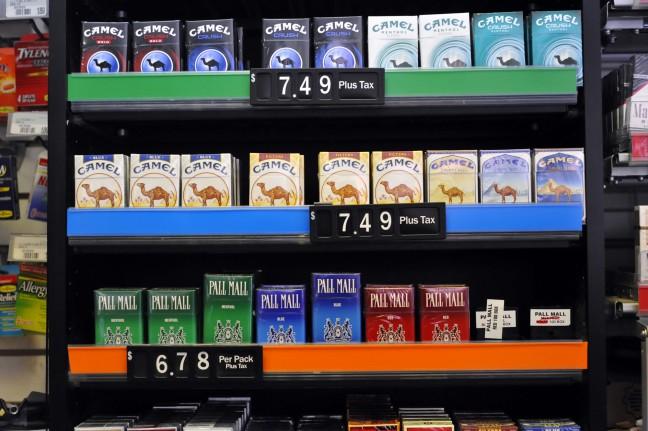Although the state has issued cigarette tax hikes aimed at curbing tobacco use, the public policy initiative has also created a black market for cigarettes as some smuggle smokes into Wisconsin from out of state to avoid the tax and maximize profits.
According to a recent study released by the Tax Foundation, 34.6 percent of cigarettes sold in Wisconsin are smuggled in across state lines, ranking Wisconsin fifth nationally for inbound cigarette smuggling consumption.
Between 2006 and 2012, Wisconsin’s cigarette tax jumped 227 percent to a rate of $2.52 per pack. Wisconsin’s smuggling consumption rate went up 21.5 percent during the same time period, according to the study.
The illegal smuggling of contraband cigarettes into the state is a problem the Department of Revenue is actively fighting, Jennifer Western, DOR assistant deputy secretary, said.
“The [DOR] addressed cigarette smuggling in the past year by intercepting over 70,000 packs of contraband cigarettes which had been shipped into Wisconsin and did not have Wisconsin cigarette tax stamps,” she said. “This means no Wisconsin cigarette taxes were paid on those cigarettes.”
Western said contraband cigarettes create an uneven playing field for retailers, distributors and manufacturers who comply with state and federal law.
Melissa Horn, tobacco policy and government relations director at Health First Wisconsin, said the policy actions the state has taken on smuggling and cigarette taxation have proven to be effective but more resources are needed to continue combating the issue.
“Our organization supports the [DOR]’s investigations of any fraudulent tax stamps or sale issues across state borders,” Horn said.
She said Health First Wisconsin believes the $2.52 cigarette pack tax increase has been successful and the tax has played a large role in curbing of costs associated with treatment of smoking-related illnesses and dropping Wisconsin’s youth smoking rates to new lows.
Although the state’s tax rate is one of the highest in the Midwest — second only to Minnesota’s tax of $2.83 per pack —Wisconsin has the highest smuggling rate of the region, Western said.
Health First Wisconsin suggested an increase in government investment to combat smuggling of tobacco products as well as overall tobacco use, Horn said.
“Wisconsin needs to invest more to reduce tobacco use in our state because we are falling well short of what we should put towards reducing tobacco use,” Horn said.
Horn said the Centers for Disease Control and Prevention recommended that Wisconsin spend up to 10 times what it currently does on tobacco prevention and control. Although Wisconsin generates more than $600 million in annual tobacco tax revenue, the state only spends $5.6 million on tobacco use prevention, she said.
The Department of Revenue is currently conducting a “broad study” on the cigarette tax collection system and cigarette smuggling, Western said, adding that since the report was not complete, it would be premature to comment directly on the Tax Foundation study.
Although the smuggling problem in Wisconsin has grown in the six-year period according to the Tax Foundation study, Horn said Health First Wisconsin still strongly supports the large increases in cigarette pack taxed, saying they effectively reduce tobacco use in Wisconsin.













